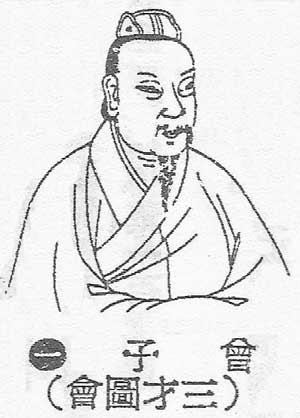|
T of C
Home |
My Work |
Hand- books |
Qin as Object |
Qin in Art |
Poetry / Song |
Hear, Watch |
Play Qin |
Analysis | History |
Ideo- logy |
Miscel- lanea |
More Info |
Personal | email me search me |
| Qin Biographies | 首頁 |
|
Zengzi
- Qin Shi #24 |
曾子 1
琴史 #24 2 Ming impression of Zengzi3 |
 Zengzi and Ziyu were nicknames of Zeng Shen (505-436). One of the most prominent among the disciples of Confucius, he was especially famous for his filiality. Both he and his father Zeng Dian,4 an early disciple of Confucius, are said to have been qin players.
Zengzi and Ziyu were nicknames of Zeng Shen (505-436). One of the most prominent among the disciples of Confucius, he was especially famous for his filiality. Both he and his father Zeng Dian,4 an early disciple of Confucius, are said to have been qin players.
He has been connected to several qin melodies:
- 殘形操 Can Xing Cao; mentioned in Qin Shi biography below.
- 歸耕之曲 Gui Geng zhi Qu; the account below in Qin Shi says it is Qin Cao (see Hejian Zage #13); perhaps it has the same theme as the song Gui Geng in Fengxuan Xuanpin.
- 梁山操 Liangshan Cao; not mentioned below in Qin Shi, but introduced in Qin Cao, where it is Hejian Zage #14. Here it is another story about Zengzi ploughing fields for his parents. 5
Zengzi had his own Three Pleasures, but the melody of that name is generally associated with Rong Qiqi.
A story from Kongzi Jiayu about Zengzi and the qin is related in Qinshu Daquan Folio 16 #13.6
The original essay on Zengzi in Qin Shi begins as follows.7
Translation incomplete (see footnote).
Footnotes (Shorthand references are explained on a
separate page)
1.
曾子 Zengzi (Wiki; see also Wiki
Disciples of Confucius)
14627.5 曾子 Zengzi = .156 曾參 Zeng Shen, style name 子輿 Ziyu
also Zengzi: name of a book, in 18 篇 pian.
(Return)
3.
Image
From 三才圖會 Sancai Tuhui.
(Return)
4.
Zeng Dian (曾點 or 曾蒧) (Wiki)
Also called 曾晳 Zeng Xi or 子皙 Zi Xi, he was by reputation a good musician. Sometimes he is said to have been a qin player, but a passage in Lun Yu (XI/26) has him playing the se. Several disciples are responding to a question from Confucius about what they would do if they found someone who appreciated their abilities. When it comes to Dian the passage is as follows (translation from D. C. Lau):
"Dian, how about you?" After a few dying notes came the final chord, and then he stood up from his (se zither). "I differ from the other three in my choice." The Master said, "What harm is there in that? After all each man is stating what he has set his heart upon." "In late spring, after the spring clothes have been newly made, I should like, together with five or six adults and six or seven boys, to go bathing in the River Yi and enjoy the breeze on the Rain Altar, and then to go home chanting poetry." The Master sighed and said, "I am all in favour of Dian."
Confucius is sometimes depicted playing the qin as he teachers; to have a student playing an instrument in this context is thus quite distinctive.
(Return)
5.
Liangshan Lament (梁山操 Liangshan Cao)
It is listed in the Qin Cao entry, where it is
Hejian Zage #14, but no details are given. However, Qinxue Congshu Book I gives introductions to all the Qin Cao melodies. The one for Liangshan Cao
(QQJC XXX/27-8) is as follows:
To this the editor added in smaller doubled column print: 案北堂書,鈔天部,藝文類,聚天部,文選,擬今曰:梁宴會詩注太平御覽天部引皆作乃作梁山之操。
The main text says that Liangshan Lament was created by Zengzi. He served his parents by ploughing the fields below Mount Tai no matter what the weather. One month when we was unable to return for 10 days he wrote this as a very sad song.
(Return)
6.
Zengzi in Kongzi Jiayu
The text in Qinshu Daquan Folio 16 #13 is as follows:
When Zengzi was weeding gourd plants he mistakenly cut the roots. Zeng Xi (his father), angered, got a large stick to beat him on the back. Zengzi (apologized then went home and played his qin, hoping that if his father listened he would realize his son's propriety was firm).
Not yet translated.
(Return)
7.
Original Qin Shi entry
The text in Qin Shi (entry #24) is as follows:
曾子嘗耘瓜,誤斷其根。曾皙怒,擊之幾死。有頃乃蘇。欣然而起,進於曾皙曰:「向也,參得罪於大人,大人用力教參,得無疾乎!」退而就房,援琴而歌,欲令曾皙聞之,知其體康也。然孔子聞之而怒,曰,「舜之事瞽瞍,小捶則待,大杖則走,故瞽瞍不犯不父之罪。今參委身以待暴怒,殆而不避,既死則陷父於不義矣。」曾子造孔子而謝過。 (Similar to the Kongzi Jiayu account given above of Zengzi and his father, including Confucius' reaction.)
曾子嘗夢貍,不見其首,以為不祥,援琴而鼓之。作「殘形操」。有立於戶外而聽之者。曲終而入曰:「善哉,鼓琴乎!身已成矣,而惜未見其首也。」蓋夢狸而無首,此為怪祥。 (This relates a version of the story connected to Can Xing Cao.)
君子居正以俟命,福至不喜,禍至不怵,故鼓琴以寫其意。而曾子卒無禍,後之君子可以監矣。又有「歸耕」之曲。曰,往而不返者年也。不可得而再事者親也。見於「琴操」。 (Concerns Gui Geng, mentioned above.)
萬世之下,言孝者必稱子輿美夫。
Myriad generations later, when discussing "filiality" one must say that Ziyu (Zengzi) was beautiful with it.
Translation incomplete.
(Return)
Return to QSCB, or to the Guqin ToC.